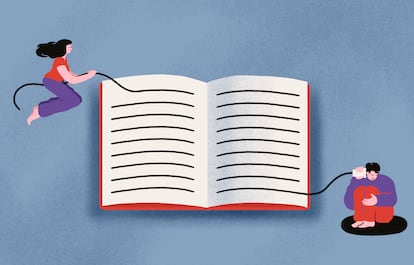To book or audiobook? That is not the question
Reading or listening to a text are distinct experiences and serve different purposes

Is listening to an audiobook the same as reading it? Am I cheating if I go to my book club having listened to the novel instead of reading it? Daniel Willingham, a professor in the Department of Psychology at the University of Virginia and author of The Reading Mind: A Cognitive Approach to Understanding How the Mind Reads, says that these are the questions he has to answer most; after conducting many experiments in his lab and writing a book, he is considered an expert on the subject. Professor Willingham usually answers in Solomon-like fashion: reading is not superior to listening, but the two aren’t the same, either.
A now-classic 2010 study measured what one group of students remembered after listening to a 22-minute podcast on a scientific subject and compared it to another group who read the same thing from a printed text. Although both groups spent the same amount of time on the material, two days later the readers remembered 81% of the subject, while the listeners had retained only 59% of what they heard.
The authors attributed the difference to the complex, hard-to-understand subject matter. Perhaps, if both groups had read or listened to an adventure story or a crime novel, they would have remembered the whole plot. In the experiment, the goal was to learn, not leisure, which changes everything. “When we are focused and learning we slow down, we reread the difficult parts, we go back. All of that is easier to do with a text than with an audiobook,” the professor explains in his book. Research by Trish L. Varao Sousa, of the University of Waterloo in Ontario (Canada), also concludes that while listening may be attractive and convenient — it is compatible with modern life’s high levels of multitasking — it is the least suitable option for learning because it “causes higher rates of mental wandering.”
Another 2018 experiment involving high school students, published in the journal Scholarship of Teaching and Learning in Psychology, showed that participants remembered a passage they read better than one they listened to. A reader is more focused on a printed text than on an audio version. Some physical references such as the spaces between paragraphs, the semicolons, the capital letters, and even the texture of the pages, the cover of the book and the thickness of the copy are conducive to remembering. Some experts even believe that it is more effective to study with traditional paper books as opposed to digital ones, where the reader gets lost when endlessly scrolling uniform content and each page looks too much like the previous one.
For everything else, listening to audiobooks is modern and can’t be beat. It adapts to everything, goes everywhere and introduces literature into areas of life that were previously closed off to it. One can listen to a novel while stuck in a traffic jam, riding the subway or playing sports. The comprehension of the content, if not its recall, is similar, and one does not have to devote one’s full attention to it. This was demonstrated in 1977 in a study that is now considered to be a classic in the field, “Summarizing Stories after Reading and Listening.” In 2016, another paper, “Does Modality Matter?” confirmed that hypothesis: there was no difference in the comprehension of what was read versus what was listened to, especially in the case of narratives that had a more or less predictable outcome and laid out familiar ideas in a logical progression.
Neuroscientist Kristen Willeumier explains in her book Biohack Your Brain that reading and listening are activities that keep the brain at high levels of activity. “The difference is in the way the brain hemispheres are activated. When we read, the left hemisphere, which is linked to language processing, is working. However, when we listen, both hemispheres remain active to process speech and listening. This means that the information is processed in the same cortical areas, whether the input comes from reading or listening.”
“150 years ago reading was an acquired skill that separated social classes”
Scientist Kepa Paz-Alonso, a researcher at the BCBL (Basque Center on Cognition, Brain and Language) and an expert in cognitive neuroscience, confirms the hypothesis that the information is processed in the same areas of the brain in both cases; he himself listens to audiobooks with WhatsApp audio, because he finds it “faster and more convenient.” He goes on to say that “in our laboratories we proved — for Chinese, Hebrew, English and Spanish, four languages that have very different writing codes — that reading parasitizes the neural networks that already exist in the brain for oral communication.”
Thus, Paz-Alonso thinks that considering those who read a book intellectually or morally superior to those who listen to one is “an outmoded idea…150 years ago reading was an acquired skill that separated social classes, but today, from a practical perspective, listening tools save time and have clear advantages.”
The most obvious one is that listening to a book leaves one’s hands and eyes free, making literature compatible with routine activities such as walking and doing the laundry. This is one of the reasons for the format’s popularity.
Another benefit of listening to books is that it can improve our comprehension of unusual words in the original work. If the narrator does intonations and word declensions well, classic texts like Shakespeare’s works seem easier to understand than when we read them alone in the silence of our room. In addition, the audiobook narrator’s emotion generates empathy and feelings of intimacy toward the characters in the story. If the emotional circuits of the brain are activated and we begin to imagine, we can enjoy much more than reading.
Advocates of traditional reading point to a bad habit of our current age: speeding up audiobooks and altering the tempo of the narration to consume more content. “But doesn’t that [also] happen when reading a text?” asks Paz-Alonso, who observes that speed-readers read diagonally or scan entire sentences.
But contrary to what we might think, reading a book is faster than listening to it. According to the VirtualSpeech platform, most podcasters and narrators speak between 150 and 160 words per minute, while readers tend to consume between 300 and 400 words in the same period. If we get more impatient when listening to a book than we do when reading one, it is because we tend to consume audiobooks in a rushed state of multitasking, for example, in the middle of a traffic jam. When we want things to happen, we want everything to end at once (e.g., the traffic jam and, incidentally, the story). Hardly anyone listens to an audiobook in calm, focused silence, while it is very likely that many read in just that state.
Reading and listening to a book are two distinct exercises. Each has its own well-defined uses. It is possible that someone rides the subway listening to a Phyton (a programming language) manual, but that’s not the common practice.
Willingham ended up writing an article in The New York Times to reassure anyone who felt like an imposter for listening to an audiobook instead of reading the text before attending their book club meeting: “No, you’re not cheating; you’re just having a different experience.” Choosing whether to read or listen to Shakespeare remains an open question.
Sign up for our weekly newsletter to get more English-language news coverage from EL PAÍS USA Edition
Tu suscripción se está usando en otro dispositivo
¿Quieres añadir otro usuario a tu suscripción?
Si continúas leyendo en este dispositivo, no se podrá leer en el otro.
FlechaTu suscripción se está usando en otro dispositivo y solo puedes acceder a EL PAÍS desde un dispositivo a la vez.
Si quieres compartir tu cuenta, cambia tu suscripción a la modalidad Premium, así podrás añadir otro usuario. Cada uno accederá con su propia cuenta de email, lo que os permitirá personalizar vuestra experiencia en EL PAÍS.
¿Tienes una suscripción de empresa? Accede aquí para contratar más cuentas.
En el caso de no saber quién está usando tu cuenta, te recomendamos cambiar tu contraseña aquí.
Si decides continuar compartiendo tu cuenta, este mensaje se mostrará en tu dispositivo y en el de la otra persona que está usando tu cuenta de forma indefinida, afectando a tu experiencia de lectura. Puedes consultar aquí los términos y condiciones de la suscripción digital.









































